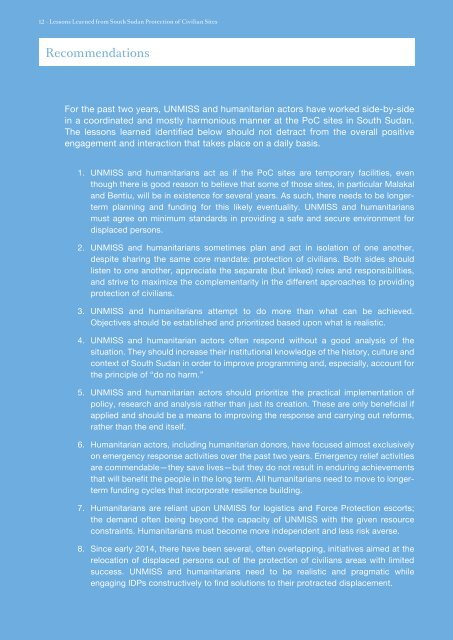Lessons Learned from South Sudan Protection of Civilian Sites 2013–2016
if_we_leave_0
if_we_leave_0
Create successful ePaper yourself
Turn your PDF publications into a flip-book with our unique Google optimized e-Paper software.
12 - <strong>Lessons</strong> <strong>Learned</strong> <strong>from</strong> <strong>South</strong> <strong>Sudan</strong> <strong>Protection</strong> <strong>of</strong> <strong>Civilian</strong> <strong>Sites</strong><br />
Recommendations<br />
For the past two years, UNMISS and humanitarian actors have worked side-by-side<br />
in a coordinated and mostly harmonious manner at the PoC sites in <strong>South</strong> <strong>Sudan</strong>.<br />
The lessons learned identified below should not detract <strong>from</strong> the overall positive<br />
engagement and interaction that takes place on a daily basis.<br />
1. UNMISS and humanitarians act as if the PoC sites are temporary facilities, even<br />
though there is good reason to believe that some <strong>of</strong> those sites, in particular Malakal<br />
and Bentiu, will be in existence for several years. As such, there needs to be longerterm<br />
planning and funding for this likely eventuality. UNMISS and humanitarians<br />
must agree on minimum standards in providing a safe and secure environment for<br />
displaced persons.<br />
2. UNMISS and humanitarians sometimes plan and act in isolation <strong>of</strong> one another,<br />
despite sharing the same core mandate: protection <strong>of</strong> civilians. Both sides should<br />
listen to one another, appreciate the separate (but linked) roles and responsibilities,<br />
and strive to maximize the complementarity in the different approaches to providing<br />
protection <strong>of</strong> civilians.<br />
3. UNMISS and humanitarians attempt to do more than what can be achieved.<br />
Objectives should be established and prioritized based upon what is realistic.<br />
4. UNMISS and humanitarian actors <strong>of</strong>ten respond without a good analysis <strong>of</strong> the<br />
situation. They should increase their institutional knowledge <strong>of</strong> the history, culture and<br />
context <strong>of</strong> <strong>South</strong> <strong>Sudan</strong> in order to improve programming and, especially, account for<br />
the principle <strong>of</strong> “do no harm.”<br />
5. UNMISS and humanitarian actors should prioritize the practical implementation <strong>of</strong><br />
policy, research and analysis rather than just its creation. These are only beneficial if<br />
applied and should be a means to improving the response and carrying out reforms,<br />
rather than the end itself.<br />
6. Humanitarian actors, including humanitarian donors, have focused almost exclusively<br />
on emergency response activities over the past two years. Emergency relief activities<br />
are commendable—they save lives—but they do not result in enduring achievements<br />
that will benefit the people in the long term. All humanitarians need to move to longerterm<br />
funding cycles that incorporate resilience building.<br />
7. Humanitarians are reliant upon UNMISS for logistics and Force <strong>Protection</strong> escorts;<br />
the demand <strong>of</strong>ten being beyond the capacity <strong>of</strong> UNMISS with the given resource<br />
constraints. Humanitarians must become more independent and less risk averse.<br />
8. Since early 2014, there have been several, <strong>of</strong>ten overlapping, initiatives aimed at the<br />
relocation <strong>of</strong> displaced persons out <strong>of</strong> the protection <strong>of</strong> civilians areas with limited<br />
success. UNMISS and humanitarians need to be realistic and pragmatic while<br />
engaging IDPs constructively to find solutions to their protracted displacement.


